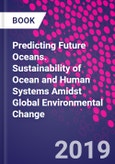Predicting Future Oceans: Sustainability of Ocean and Human Systems Amidst Global Environmental Change provides a synthesis of our knowledge of the future state of the oceans. The editors undertake the challenge of integrating diverse perspectives-from oceanography to anthropology-to exhibit the changes in ecological conditions and their socioeconomic implications. Each contributing author provides a novel perspective, with the book as a whole collating scholarly understandings of future oceans and coastal communities across the world. The diverse perspectives, syntheses and state-of-the-art natural and social sciences contributions are led by past and current research fellows and principal investigators of the Nereus Program network.
This includes members at 17 leading research institutes, addressing themes such as oceanography, biodiversity, fisheries, mariculture production, economics, pollution, public health and marine policy.
This book is a comprehensive resource for senior undergraduate and postgraduate readers studying social and natural science, as well as practitioners working in the field of natural resources management and marine conservation.
Please Note: This is an On Demand product, delivery may take up to 11 working days after payment has been received.
Table of Contents
Section 1: Predicting future oceans 1. Rethinking oceans as coupled human-natural systems to achieve sustainability
Section 2: Changing ocean systems 2. Synthesis: Changing ocean systems 3. Drivers of fisheries production in complex social-ecological systems 4. Changing Seasonality of the Sea: Past, Present, and Future 5. Extreme climate events in the oceans 6. Pathways of methylmercury accumulation in a changing ocean 7. Building confidence in projections of future ocean capacity 8. Coastal upwelling and climate change
Section 3: Changing marine ecosystems and biodiversity 9. Sythesis: Changing marine ecosystems and biodiversity 10. Current and future biogeography of marine exploited groups under climate change 11. The role of cyclical oscillations in species distributions shifts under climate change 12. Changing biomass flows in marine ecosystems: From the past to the future 13. Jellyfishes in a changing ocean 14. Understanding fisheries using time series data: importance and opportunities emerging from models of bottom up forcing 15. The Sea Around Us as provider of global fisheries catch and related marine biodiversity data to the Nereus Program and civil society 16. Life history of marine fishes and their implications for the future oceans
Section 4: Changing fisheries and seafood supply 17. Synthesis: Changing fisheries and seafood supply 18. Projecting fishing effort dynamics and the economics of fishing in the 21st century under climate change 19. Prospect of mariculture under climate change 20. Tourist seafood consumption's role in tourism adaptation in Pacific Island Countries for coastal food security under climate change 21. Integrating environmental information into stock assessment models for fisheries management 22. The future landscape of the global seafood market 23. Climate change adaptations and spatial fisheries management 24. Climate Change, Contaminants, and Country Food: Collaborating with Communities to Promote Food Security in the Arctic
Section 5: Changing social world of the ocean 25. Synthesis: Changing social world of the oceans 26. The relevance of human rights to socially responsible seafood 27. The impact of environmental change on small-scale fishing communities: Moving beyond adaptive capacity to community response 28. Coastal Indigenous Peoples in global ocean governance 29. The role of corporate social responsibility for ocean sustainability 30. Ocean policy on the water incorporating fishermen's perspectives 31. Traditional ecological knowledge in displacement and migration 32. Can aspirations lead us to the oceans we want?
Section 6: Governance and well-being in changing oceans 33. Synthesis: The opportunities of changing ocean governance for sustainability 34. A Blue Economy: Equitable, Sustainable, and Viable Development in the World's Oceans 35. Exploring the knowns and unknowns of international fishery conflicts 36. The future of mangrove fishing communities 37. The last commons: (Re)constructing an ocean future 38. New actors, new possibilities, new challenges Non-state actor participation in global fisheries management 39. Climate change vulnerability and ocean governance
Section 7: Ocean governance beyond boundaries 40. Synthesis: The opportunities of changing ocean governance for sustainability with Erik 41. Conserving the great blue "beyond." Incorporating the dynamic and connected nature of the open ocean in the biodiversity beyond national jurisdiction (BBNJ) negotiations 42. Legitimacy as a resource for effective international marine management 43. Improving fisheries governance in a fragmented and decentralized world 44. The Trouble with Tunas: International Fisheries Science and Policy in an Uncertain Future 45. The road to implementing an ecosystem-based approach to high seas fisheries management 46. Ocean Pollution in an Era of Changing Oceans and Climate Change: Towards Ocean Conservation Solutions 47. Beyond prediction: Radical Ocean Futures- A science fiction prototyping approach to imagining our future oceans
Section 8: Conclusion 48. Future pathways for the oceans considering climate change and social equity








